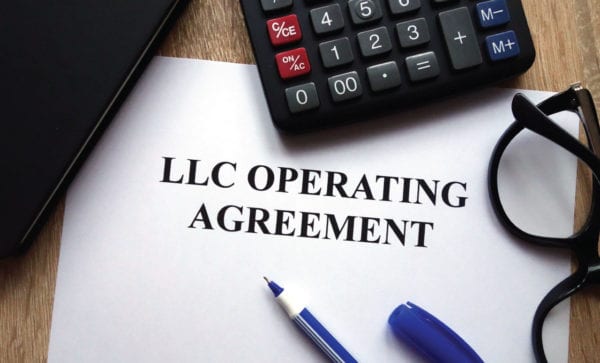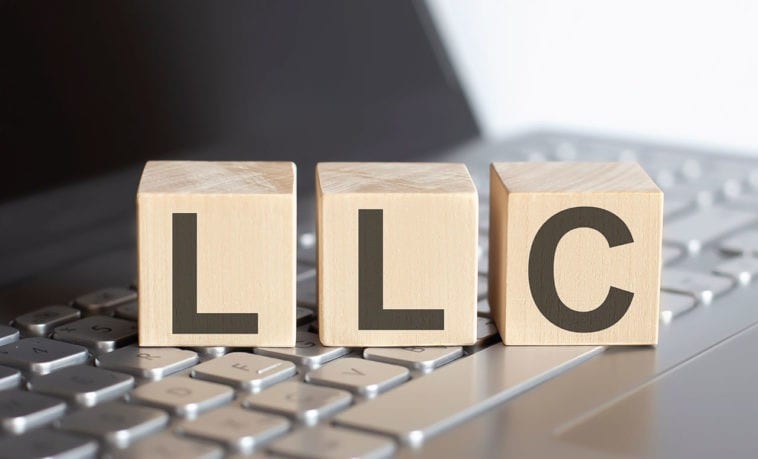When you started your business, a sole proprietorship structure was the easiest option. Now that you have more experience, you might wonder if a limited liability company (LLC) would be a better fit for your business.
A business that operates as a sole proprietor can transition to an LLC, but you can’t simply convert a sole proprietorship to an LLC. Instead, you must form an LLC in place of your existing sole proprietorship.
Sole Proprietorship vs. LLC: What’s the Difference?

Sole proprietorship and limited liability company are two types of business structures.
What Is a Sole Proprietorship?
A sole proprietor is a self-employed individual who goes into business. Sole proprietorships only have one owner, although they can hire employees.
A sole proprietorship is the easiest kind of business to set up, according to the U.S. Small Business Administration, but it offers the business owner the least legal protection. Legally, a sole proprietorship is not a separate business entity distinct from its owner. When you operate as a sole proprietor, your personal assets could be at risk.
What Is a Limited Liability Company?
A limited liability company is a legally separate business entity established by one or more owners, or members.
Can a Sole Proprietor Be an LLC?
Sole proprietorships and LLCs are two different types of business entities. A company can, however, be a single-member LLC.
Owners of single-member LLCs don’t have to share profits or compromise with other owners on business decisions. They retain full control of the company’s operations and income, just as sole proprietors do.
What Are the Advantages of Changing From a Sole Proprietorship to an LLC?

The biggest advantage of changing your business structure from a sole proprietorship is liability protection.
If your LLC is sued or takes on debt, you won’t be personally responsible for the financial liabilities. You can’t lose your car, your home, or your savings just because your business flops, as long as your company is an LLC instead of a sole proprietorship.
Another advantage of the LLC business structure is tax flexibility. An LLC can choose to be taxed as a pass-through entity or a corporation, whichever tax status works best for them.
If you’re looking to grow your company through investments or business loans, potential investors and lenders may view a limited liability company as more legitimate than a sole proprietorship. Getting capital may be easier if your business is an LLC or corporation.
Is an LLC Better Than Sole Proprietorship?
An LLC offers more liability protection than a sole proprietorship, which doesn’t have this boundary between the owner and the business.
If you work in an industry that doesn’t require much capital to run your business, debt may not be a big concern even if you are a sole proprietor. You could also purchase professional liability insurance to minimize the risk of a business lawsuit seizing your personal assets without altering your business structure.
An LLC is a popular solution to a number of small business woes, but it has some disadvantages, too.
Disadvantages of an LLC
Compared to a sole proprietorship, the two biggest disadvantages of an LLC are complexity and cost.
Forming an LLC isn’t difficult, especially compared to setting up a corporation. Still, the process is a lot more involved than simply registering a business as a sole proprietor.
Running an LLC also costs more than running a sole proprietorship. You have to pay state fees to establish your new LLC. You may wish to hire an attorney to write the LLC operating agreement and other contracts. You might also be responsible for paying annual franchise taxes, fees to file annual reports, and other costs required for LLCs but not sole proprietorships.
8 Steps to Change From a Sole Proprietorship to an LLC
The process of forming an LLC varies from state to state. Registrations of sole proprietorships and DBA names—which both sole proprietorships and LLCs can use—are sometimes managed at the county level rather than the state level.
Due to these factors, sole proprietors planning to convert their business to an LLC should do some research into the exact laws and processes that apply in their state and county. In general, though, you would take the following steps to change a sole proprietorship to an LLC.
1. Choose Your New Business Name

The first thing you must have to change a sole proprietorship to an LLC is a name for your new business.
You should start by running a business name search in your state’s database. Even if you used a name as your DBA previously, you must make sure that name is legally available for registration as an LLC.
You may need to cancel or withdraw your sole proprietorship’s existing DBA name to use it as your LLC name or wrap up loose ends with your old business. Check with your state and county to determine whether to withdraw a DBA name at the start or the end of the process.
2. File Your Articles of Organization

You form an LLC by filing documents called articles of organization with your secretary of state.
What to Expect When Filing Articles of Organization
The forms themselves aren’t as daunting as you might expect and may be only a page or two long. Generally, you need information like your LLC name, whether it will be member-managed or manager-managed, the purpose of LLC formation, and your name and address as the LLC’s organizer.
You must pay a fee to file articles of organization for a new LLC. Several states, like Kentucky, charge LLC filing fees of $50 or less, but other states charge hundreds of dollars. In Massachusetts, for example, the cost to file a certificate of organization for an LLC is $500.
Before you can submit your articles of organization to the state, you must gather all of the information that belongs in this document.
Choosing a Registered Agent for Your LLC
When filing your articles of organization, you must name a registered agent for your LLC. A registered agent is a person you designate to receive legal notices, tax documents, and official state and federal correspondence. For many LLCs, hiring a commercial registered agent is the best option.
3. Write Your LLC Operating Agreement

Now that your limited liability company is official, you need to write an operating agreement. An LLC operating agreement is a legal contract that expresses how you will operate the company and how the small business will approach changes and challenges in the future.
An operating agreement is a must for multi-member LLCs, but you should write one even if you’re starting as a single-member LLC. This agreement outlines your rights, responsibilities, and capital contributions to the LLC. It also documents the founding of the company, its management structure, and how to go about making ownership changes.
Smart business owners plan ahead by including in their operating agreement the process the LLC would use to add new members, transfer ownership, or dissolve the business.
Because an LLC operating agreement is a legally binding contract, it may be a good idea to hire an attorney to write it for you.
4. Apply for Your LLC’s Employer Identification Number

Don’t forget about taxes. Whether you choose to pay your LLC’s taxes as a pass-through entity or a corporation, you’re going to need to pay income tax to the IRS. Doing so requires you to set up an employer identification number (EIN). An EIN is your company’s tax identification number used to file its tax return.
To obtain a new EIN, you should apply online through the IRS website.
Do I Need a New EIN If I Change From Sole Proprietor to LLC?
Sole proprietors typically use their personal Social Security number as their tax identification number. When you change a sole proprietorship to LLC business structure, you are establishing a separate entity, so you generally need to get an EIN for that small business.
5. Establish a Bank Account for Your New Business

As a sole proprietor, you might have collected revenue and paid business expenses all through your personal bank account. When you become an LLC owner, that’s a big no-no.
Even if you set up a single-member LLC, mixing your personal assets and your business income in the same bank account blurs the line between you and your company. This undermines the reason you decided to create an LLC in the first place.
Many small business owners set up a business checking account, a business savings account, and a business credit card.
6. Update Your Business Licenses and Permits

Your LLC most likely requires the same registrations, licenses, and permits that your business needed when it was a sole proprietorship. Be proactive about updating licenses and permits to avoid getting into legal trouble.
7. Update Contracts and Transfer Assets From the Old Business to the New Business

When changing from a sole proprietor to LLC, you need to do one thing that business owners just starting out don’t have to worry about: transfer the assets and contracts from your old business to your new business.
To update contracts with existing clients, look at the language of the contract. You may be able to simply assign your existing contract to your new company, or you may need your client to sign a new contract with the new company.
You might transfer the assets from your old business to your new one by having the LLC purchase them from the sole proprietorship or making a capital contribution to the LLC, in which you purchase an ownership interest in the company.
8. Close Your Sole Proprietorship

Find out what you need to do to officially close your sole proprietorship in your state or county. Often, this process includes filing forms with the IRS and canceling or updating all professional and business licenses, registrations, DBA names, and other credentials.
Conclusion
For most business owners, the hardest part of switching from sole proprietor to limited liability company is undertaking the process to create an LLC. Although this process can be tedious, the long-term protection LLC status affords your business is worth it.
LLC Resources
How to Start an LLC in California
How to Start an LLC in Florida
How to Start an LLC in Texas
How to Start an LLC in New York

